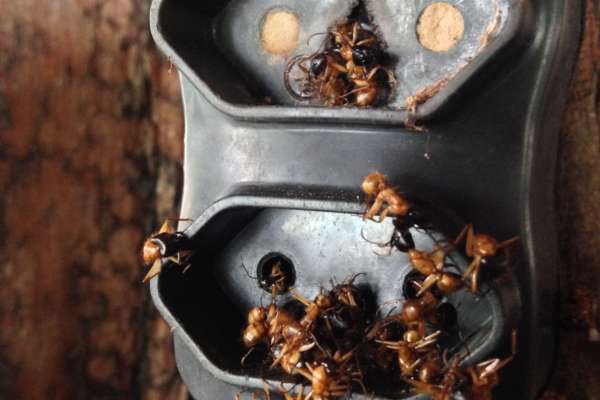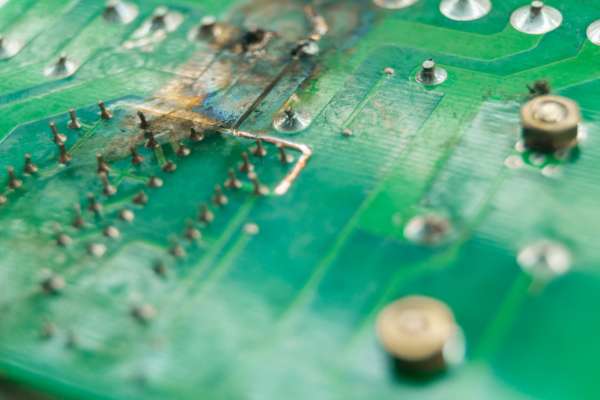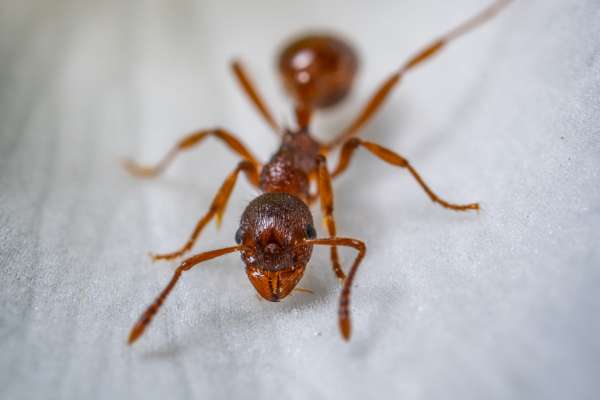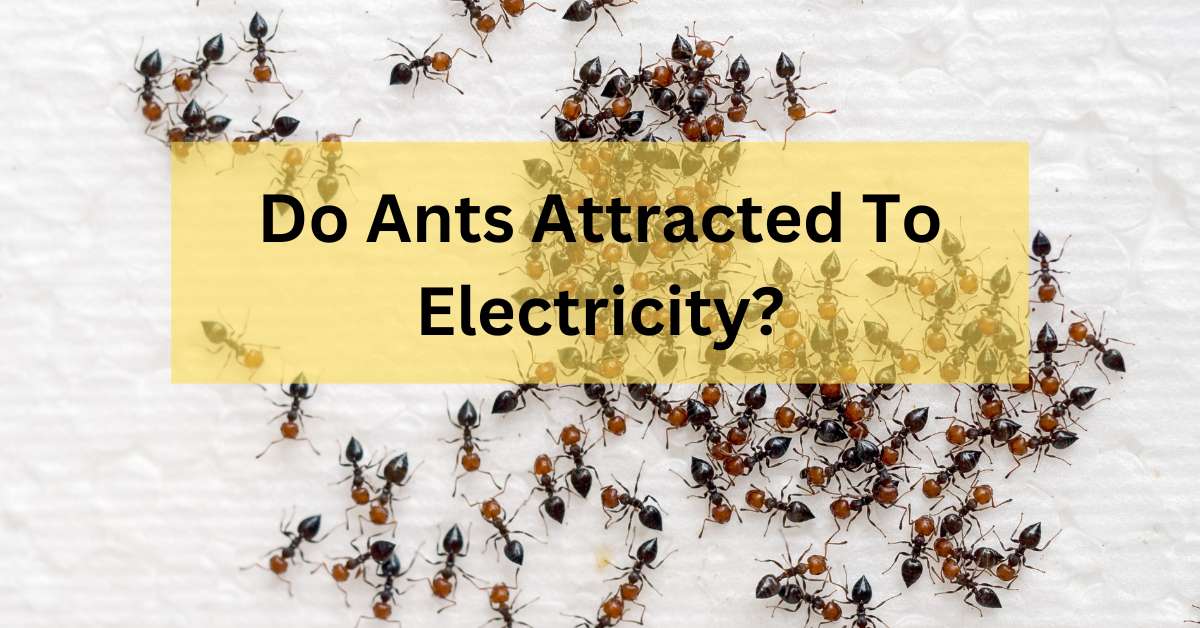You might be wondering why ants are attracted to electricity because they are infested in your transformer box, telephone box, Air conditioner, and many electronic devices. So actually, why are ants attracted to electricity?
Ants are attracted to electricity as long as it provides necessary heat for their bodies and emissions electromagnetic waves which they use as a food indicating signal.
In 2001, the total damage done by ants on communication and electrical devices was approximately146.5 million $. Therefore, I will guide you with all the information about this serious infestation and how to get rid of it.
Why do ants like electricity?

Many ants people do like electricity, and have an attraction towards it. But why do ants like electricity? It might depend on a few reasons.
Ants have the natural ability to detect electromagnetic fields and Earth’s magnetic field, which they use to find food sources and their nest on their way back. But once they are passing through a manmade electronic zone, they are disturbed and attracted to the electromagnetic field.
Usually, ants are attracted to mild heat. Not the extreme heat or extreme cold. Especially in a cold season like winter, they might choose your transformer box or any sort of electrical outlet as their warm place to get survived. As electronic devices, outlets, transformer boxes, and wires are warming more frequently, they might decide to stay there for the long run.
Once ants establish a small colony in an electronic device due to the fact that ants like electricity, they will certainly birth new workers and enhance the colony as long as they feel it is a safe place.
Ants are tended to choose electronic devices as their nest because of the natural outlook of the product on its own.
For instance, if ants make their colony on a TV, it is all covered with plastic, and no disturbs or attacks from the outer world. Hence, the safety that an electronic product generates can also be a fact that is why ants like electricity.
Why are ants attracted to wires?

You might see it on your own or people talking, that ants are attracted to wires. Do you know the reason?
Here is why?
Ants are thoroughly attractive to wires especially if the metal wires expose to the outer world and leak the electromagnetic signals. Moreover, ants prefer to absorb the warmth that wires generate and chew through rubber protection.
Initially, ants are attracted to electronic devices because of the signals it generates. When they get to whatever the device they are starting to chew the wires on it.
Common species like imported red ants, black ants, and fire ants can’t rip through the metal part of the wire. But still, this remains a substantial problem.
Because when the rubber protector is damaged, there is a risk of shortage of electricity or passing electricity for a different circuit.
Additional: Ant species like leafcutter ants can rip through metal wires from their strong jaw
Can ants be attracted to electricity?
Now, we know the reason why ants are initially attracted to electricity and why they like it. But can ants be attracted to electricity furthermore?
If ants get to an electronic circuit and contact into a live wire, they might get shocked and die. Then, their bodies output pheromones from “gaster flagging” which attract more ant workers to the circuit, to help the dying ant. This process can shock ants over and over again and attract a colony of ants to electronic devices.
Vandermeer et al (2001) have stated that once there is a big ant colony in a house, ants might randomly enter the transformer boxers, plugs, and other electronic devices.
If they have contact with live wires in the circuits they will be shocked and release pheromones and ask for help from the following workers. Pheromones have the highest priority of ants’ smell trails, so they will find the damaged ants despiting any blockages or magnetic fields they encounter.
Can ants cause short circuits?

Ants can cause short circuits in electronic devices by passing the current between unnecessary circuit pairs. Electronic circuits being loaded from dead ants will make the devices unable to switch off.
Here’s what basically happens.
First, a few workers will be electrocuted and release pheromones which attract other workers. Thus, the following ant workers who contact the shocked ants will also get shocked by the electricity. This can continue as a chain and cause passing electricity within several circuits.
There are Some serious cases have reported regarding short circuit errors that were caused by ant infestations.
- Accordingly to the documentation issued by Florida, United States, Carpenter ants have caused a shortage in irrigation control boards in Florida.
- Acrobat ants in Texas have let an air conditioning unit malfunction by a shortened circuit, and owners had to replace a new switching mechanism into the air conditioner which cost them 196.54 $.
I have experienced some of my light switches being unable to turn off in the cold season. So, I removed the nuts and took a look at the circuit, and I suddenly found the issue.
There was a substantial ant colony behind the switch. And it blocks the switch with dead ants, eggs, pupae, and everything. Hence, the switch is not functioning.
Research performed in Texas in 2002 has mentioned an ant species called “Raspberry crazy ant” that was an invasive pest. This crazy ant has damaged a lot of electronic utilities in parks and household electronic items and made them function all around the day by clogging the switches.
Which ants are attracted to electricity?

Commonly found ant species such as black ants, red ants, fire ants, and carpenter ants are mostly attracted to electricity and electronic devices. Nevertheless, any kind of ant species can be attracted to electronic devices as long as they are being provided the required heat.
Note: Even though leafcutter ants can rip through metal wires, they are not the kind of ant that is particularly attracted to electricity.
Can ants be electrocuted?
Even though ants acquire a low surface area, they are still electrocuted. Tiny ants with a thin exoskeleton have a better tolerance against electronic voltage, compared with larger species.
When the ant gets bigger, the surface area and exoskeleton will also get bigger in size. So voltage can be more harmful to larger species. In many cases, ants will be fatally damaged when they get electrocuted.
Despiting the fact of the surface area of the ant, tiny black ants, and red ants are dying from being electrified quite frequently.
According to Dr. Eduardo Fox, (a zoology expert), ants can sense electromagnetic fields better than humans.
How to get rid of electric ants?
If your electric outlets or any other electronic devices are being infested by these little ants that are attracted to electricity, you have to work on removing the ants temporarily and also need to take action to get rid of them in the long run.
Here are some tips that will help you to get rid of electric ants in your house.
- Clean up the outlet or electronic device and destroy the nest
Ants are more likely to make their nests in electric outlets and devices because it provides them all the safety with the plastic covering.
First, remove the nuts and clean up all around. You will find an ant colony with larvae here and there around. - Screw the nuts tight
loose fitting is the first opportunity for ants to get into the devices. So make sure you are tightening up the nuts. - Fit it tight and use an insect sticky tape
Because you are dealing with a sensible electronic device, I don’t recommend you to use any kind of pesticide spray on it. Instead, you can use sticky baits around whatever power outlet or device. It will make the harder to get themselves in.
The video below will demonstrate how to get rid of ants in a power outlet.

